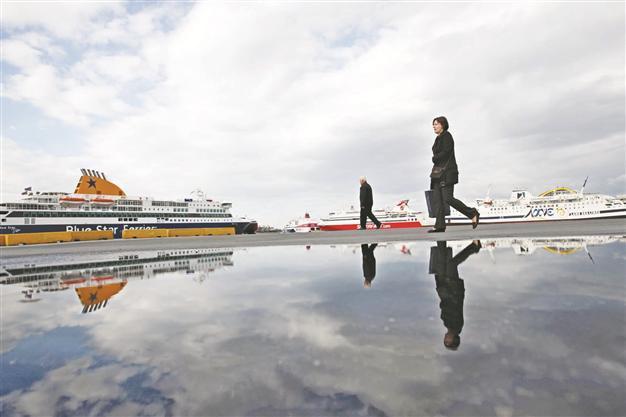Greek social unrest reflected at sea ports
ATHENS - Agence France-Presse

Reflected in water, a woman walks past at Piraeus port near Athens during a 48-hours strike at the port of Piraeus yesterday. AP photo
Greek sailors yesterday began a two-day strike against government reforms, halting ferry connections to the islands ahead of the Orthodox Easter holidays and disrupting the export of agricultural produce.The sailors’ union Pno said no ferries would leave Piraeus and the neighboring ports of Lavrion and Rafina, all near Athens, three weeks after a previous work stoppage. Greek Orthodox Easter this year falls on April 15.
“Our hand was forced by the government’s callous policies,” Antonis Dalakogiorgos, head of the Pno-affiliated union of Greek merchant marine sailors, told Flash Radio.
“They have brought measures that eliminate decades of rights gains,” he said.
The walkout will also affect the transport of agricultural goods mainly from the island of Crete whose economy depends on tourism and crop sales.
“Unless a solution is found, more than 15,000 tons of farm produce will have to be destroyed,” said George Dispyrakis, head of growers at the Cretan town of Tymbaki.
Healthcare in debt-hit Greece risks becoming a privilege after two years of sweeping budget cuts imposed by the authorities in their desperate effort to slash bills and steady the finances, experts warn.
With public health spending at around 10 billion euros, 25 percent lower than in 2009, staying healthy “risks becoming a privilege,” says Haralambos Economou, a sociology professor at Panteion University in Athens.
Two years of biting austerity have left Greece in a fifth year of recession with over a million people officially unemployed, some 20 percent of the workforce.
Healthcare experts argue that up to 10 percent of the population now has to dig into their dwindling savings if they need treatment.
Previously, most Greeks had turned to private care whenever possible, even to the tune of paying nearly 40 percent of total health costs out of their own pocket, one of the highest rates among developed nations.
Now, demand at public hospitals is up 20-30 percent as they fall back on the state system just as it comes under intense pressure from the cost cutting.
Worse still, many people seek to finesse the system, turning up at hospital as an emergency case in order to get immediate treatment, rather than arrange -- and have to pay for -- an appointment in advance.
Low-rate debt
Meanwhile, Greece yesterday paid sharply lower rates to raise 1.3 billion euros ($1.7 billion) in a sale of 6-month treasury bills, the debt management agency said.
“Total bids reached 2.62 billion euros and the amount finally accepted was 1.30 billion euros,” the agency said in a statement, with the interest paid to investors 4.55 percent, down from 4.80 percent at the last equivalent sale on March 6 which had raised 1.14 billion euros.
















